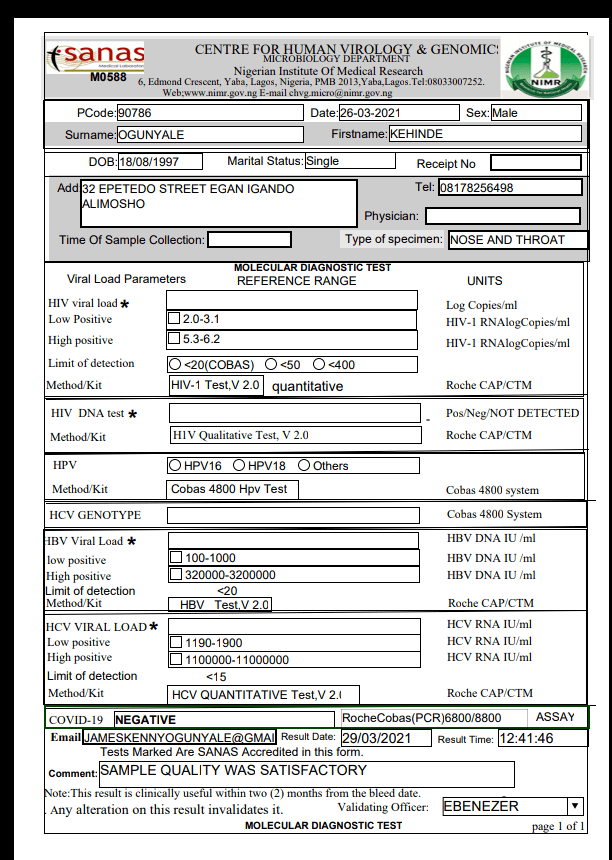Despite the announcement by the Lagos State government for residents with coronavirus-like symptoms to go to designated government-run facilities to get tested, these laboratories that carry out the tests for free, are instead redirecting patients to private laboratories where they are charged upwards of N50,000 for the test.
This reporter deliberately exposed himself to cold for four days and came down with symptoms similar to those of coronavirus – cough, headache, runny nose and fever – and presented himself for testing at several public laboratories in the city but officials at the laboratories declined to test him. Instead, they redirected him to private laboratories to get tested.
After a week’s tour to several government-run laboratories, this reporter can now paint a complete picture of how residents who might have caught the virus are routinely rejected or redirected to private laboratories.
“You must convince them well enough for you to have your test here. Although it is free, if your reasons aren’t strong enough, they would redirect you to private laboratories where you have to pay nothing less than N50,000,” a woman at the Yaba Infectious Disease Hospital (IDH), one of the public health facilities designated to offer the test for free, told this reporter as he waited to speak with a nurse.
The woman, dressed in her long sparkling gown, was also a patient at the centre and had been tested for the virus earlier that day.
“My husband has been isolated here and undergoing treatment here, so it was easy for me and my children to get tested. They wouldn’t agree to test anyone here but redirect you to the private laboratory where you have to pay money. I suggest you convince them well,” she added.
The reporter, heeding her advice, requested the registration process and was shown a web address written on the doors of the lab. As the reporter tried to register, the same woman asked: “Are you here to know your status or do you think you have the virus?”.
“He has the symptoms because he might have had contact with someone who is already in isolation,” the reporter’s colleague who accompanied him to the health facility replied.
After the unfinished registration, as the reporter was unsure of some questions asked, she said,” Go straight down to the office on your left, knock at the door and enter. You will see some nurses there, speak to them on the purpose of your coming, they will put you through the registration processes.”
However, after two days of having the test–48 hours, the reporter got his result, sent to him via his mail, testing negative for the virus.

Poor testing erodes the fight against the virus
The investigation revealed that out of six public laboratories listed on the NCDC portal, only NIMR was accessible to the reporter for free treatment despite suffering COVID-like symptoms.
This experience gives an insight into how public laboratories contribute to poor testing records of residents in Lagos thereby undermining the effort of the government to increase testing.
The reluctance of public laboratories to offer free testing might be posing a threat to the state’s healthcare systems which in turn contributes to the spread of the virus.
The state had consistently led the COVID-19 chart pulling over 55,000 reported cases within a year since the index case of the virus was reported in Nigeria.
During this period, the state has received funding and support from the federal government, private organizations, non-governmental bodies, and prominent individuals – who contributed resources and donated materials to help curb the virus among citizens in both urban centres and rural areas in the state.
The Central Bank of Nigeria said donations from individuals and corporate bodies in Nigeria to the Private Sector Coalition Against COVID-19 (CACOVID) Relief Fund surpassed N21 billion.
When asked if financial expenses could be a major factor, the Director-General of the Nigerian Institute of Medical Research, Babatunde Salako, who spoke to the reporter, said the state government might be spending a lot of money to sustain the free testing operation.
“The test cost N54k and for every free test, the government may be seen to be spending that amount on individuals doing the test for free.
“I imagine it may be a constraint especially running free tests for travellers who can afford the test for their business or holiday trips. Government should not be running their business for them.
“I believe the government should have allowed public laboratories to charge at cost price at least, making the test more available to a lot more people,” he said.
In a swift reaction, the Chairman of the Lagos State Chapter of the Nigerian Medical Association, Adetunji Adenekan said, “I may not be able to respond to the questions as I don’t have information on it.”
In separate reactions, the spokesperson to the NCDC, Emeka Oguanuo, and spokesperson to the Presidential Task Force on Covid-19, Willie Bassey, said the Lagos State government was in the best position to answer.
However, efforts were made, through calls, email and text messages, to contact the Lagos State Ministry of Health but no response was received.